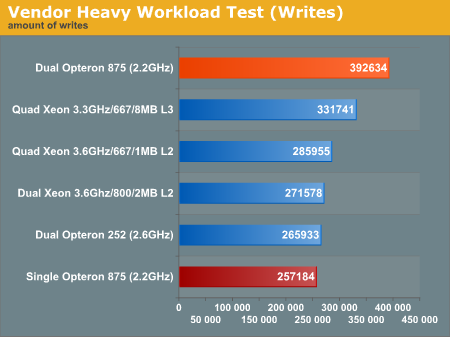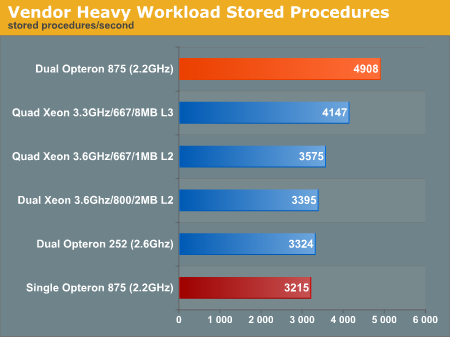AMD's dual core Opteron & Athlon 64 X2 - Server/Desktop Performance Preview
by Anand Lal Shimpi, Jason Clark & Ross Whitehead on April 21, 2005 9:25 AM EST- Posted in
- CPUs
Order Entry Results
Our Vendor test has received quite a bit of interest from certain processor vendors; rightfully so, as the workload is quite difficult to recreate.As you can see from the results below, there are some interesting conclusions that you can draw:
- The Dual Opteron 875 took the lead by 18% over the fastest Quad Intel. This should come as no surprise as we have seen in the past that the memory bandwidth limitation of the Intel FSB architecture does not allow the quads to really stretch their legs. On the other hand, the Integrated Memory Controller of the Opterons allow them to pull ahead.
- The additional L3 cache of the Quad Xeon 3.3GHz allows it to outperform the Quad Xeon 3.6GHz by 16%.
- The Quad Xeon 3.6GHz with the 667MHz FSB is only able to outperform the Dual Xeon 3.6GHz 800MHz FSB by 5%.
- The dual Xeons are able to outpace the dual 252's by 2%, and the single 875 by 5%. The Xeons success here can be attributed to the additional L2 cache.
- The Dual Opteron 875 demonstrated nice scalability by servicing 52% more requests in the same period as the single Opteron 875.













144 Comments
View All Comments
KillerBob - Friday, April 22, 2005 - link
Griswold,MT Test 1: PEE 1 - X2 0 Very likely scenario
MT Test 2: PEE 2 - X2 0 Likely scenario
MT Test 3: PEE 2 - X2 1 So-so scenario
MT Test 4: PEE 3 - X2 1 Likely scenario
MT Test 5: PEE 3 - X2 2 Likely scenario
MT Test 6: PEE 3 - X2 3 Unlikely scenario
I play a lot of games, but I never have things in the background, as a matter of fact I don't want to have anyting in the background, except for perhaps a big NewsPro download.
MrEMan - Friday, April 22, 2005 - link
102,Artificial stupidity run rampant?
or
Natural deselection (survival of the twitest)?
Quanticles - Friday, April 22, 2005 - link
I vote that 90% of the people on here have no idea what they're talking about... lolerwos - Friday, April 22, 2005 - link
"It's odd that some picture game developers immediately supporting the PhysX chip as soon as it's available, but think they'll drag their feet to take advantage of another whole CPU core at their disposal."It's basically about the implementation differences of the two. You can be relatively certain that PhysX is going to be shipping their chips/cards with libraries that allow game devs to just speed up certain processing with special function calls (ie, calculate_particle_spread()). Multi-threading requires that you design your application from the very start to take advantage of it (mostly - I would wager splitting off the background music to its own thread is reasonably straightforward).
Game logic doesn't always lend itself to multi-threading, either. If I shoot my gun, I want to hear the sound next. I don't want it to be thrown at the sound thread, where it may or may not execute next. Threading introduces latency, in other words, unless you so tightly bind your threads together that you may as well not use multi-threading.
-Erwos
Griswold - Friday, April 22, 2005 - link
KillerBob, so that makes you a brilliant illiterate, since it's not what the benchmarks say. :)cHodAXUK - Friday, April 22, 2005 - link
#83 Get a clue, a single core 3500+ is faster than the quivelant Opteron at the same speed. Why? Unregistered memory and tigher memory timinings. ECC memory comes with a 2-4% performance penalty but the big difference comes with the command speed, 2T for the Opteron and 1T 3500+, the AMD64 thrives on lower lower latancies that can make as big as an 10% performance difference and that is BEFORE we start to even think about raising the FSB speed which makes a significant difference to overall system perfomance. 15% is in no way unrealistic with a mild overclock and lower latancies, if you don't believe me then email Anand and ask him.Zebo - Friday, April 22, 2005 - link
Jep4444 (#89) What do you mean X2's "arent nearly as good as the dual core Opterons"??Comming from XS I suspect don't OC very well?
But they are the same cores as the Opterons are. and with ram should run signifigantly faster.
Or do you mean buggy? That's easily attibuted to BIOS, IE none released yet so no working BIOS.
How about a link please.
Umbra55 - Friday, April 22, 2005 - link
The benchmark overviews show "dual opteron 252 (2.6 GHz)" all over the review. I suppose this is single 252 instead of dual?Please correct accordingly
emboss - Friday, April 22, 2005 - link
#40 (Doormat):You're forgetting that the size of a dual-core is (roughly) double that of a single-core. So, assuming 1000 cores/wafer, 70% defect rate per core, then a single-core wafer (with an ASP of $500) will net AMD 700*500 = $350K.
The same wafer with dual-cores will produce (approximately) 1000/2 * (0.7)^2 = 245 CPUs. So, to get the same amount of cash per wafer, AMD needs an ASP of $1429, or the second core costing 85% more than the first core.
Of course, it's not quite this simple ("bad" chips running OK at lower speeds, etc) but it's not entirely unreasonable to see dual-cores with prices ~3 times that of a single core at the same speed grade. Intel is almost dumping (in the economic sense of the word) dual-core chips.
saratoga - Friday, April 22, 2005 - link
"saratoga, waah? There are similarities between C# and C++. While agree it's java'ish as well, it definitely has similarties to c++. One could say c# shaes similarities with c/c/c++.read away:
http://www.mastercsharp.com/article.aspx?ArticleID...
http://www.csharphelp.com/archives/archive138.html
"
I'm guessing you're not a c++ programmer ;)
Anyway, yes they both use c syntax, however thats pretty much irrelevent given that Java also uses c syntax (as does Managed c++ which incidently IS the .net language directly based on c++) and I've never heard anyone call it related to c++. Beyond (some) syntax heritage and the fact that they're both OO langauges, they're very different beasts.
""C# is directly related to C and C++. This is not just an idea, this is real. As you recall C is a root for C++ and C++ is a superset of C. C and C++ shares several syntax, library and functionality." Quoted from above.
L8r."
Err yeah c++ is mostly a superset of c++. Thats neither here nor there. Just try and use the c/c++ preprocessor in c# and you'll see very quickly what the difference is. Or try using c++ multiple inherritance. You'll find that just because you took java and added operator overloading and made binding static by default, its not c++.